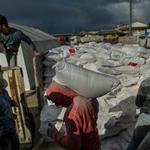The Humanitarian Antaeus: Overcoming the Power Asymmetry between Humanitarians and Armed Groups in Frontline Negotiations
In Greek mythology the giant Antaeus, a son of the gods, was known for his invincible skills in wrestling, which enabled him to collect the skulls of those he overthrew to build a temple for his father. His remarkable strength derived from his physical contact with the Earth. Antaeus remained undefeated until he encountered Hercules, who discovered the source of Antaeus’ power and vanquished him by disconnecting him from the Earth.
Such stories, in which wit and tactics overcome strength and supremacy, seem as old as the hills. However, in reality they reveal some of the qualities required by humanitarians operating on the frontlines of today’s armed conflicts. When faced with armed groups, humanitarians often negotiate from a position of weakness. What kinds of challenges do humanitarians face as they try to achieve operational aims such as the delivery of humanitarian aid to civilians? What tactics and strategies are available to them in negotiating with the humanitarian Antaeus – non-state armed groups? This blogpost discusses these questions in the light of ‘humanitarian diplomacy’, a new term for an old practice.





